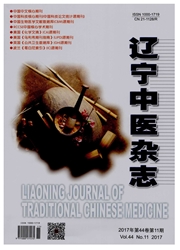

 中文摘要:
中文摘要:
目的:研究血府逐瘀汤含药血清对脂多糖诱导的血管内皮细胞Toll样受体4及下游My D88依赖性信号转导通路主要元件的影响,探讨血府逐瘀汤防治动脉粥样硬化的机制。方法:采用药物血清学方法,用新西兰大耳白兔制备含药血清以备细胞实验使用。将血管内皮细胞随机分为空白对照组、模型组、西药对照组、血府逐瘀汤组,用脂多糖刺激2 h后,分别加入西药对照药和含10%血府逐瘀汤含药血清干预,24 h后收集细胞,用荧光定量PCR方法测定TLR4、My D88、TRAF-6及NF-κB的基因表达,用Western blot方法测定TLR4和NF-κB蛋白表达。结果:用脂多糖刺激内皮细胞后,引起TLR4、My D88、TRAF-6及NF-κB的表达升高,与空白对照组比较,差异有统计学意义(P〈0.01),而用血府逐瘀汤含药血清干预以后显著抑制TLR4、My D88、TRAF-6及NF-κB的表达,与模型组比较,差异有统计学意义(P〈0.05)。结论:血府逐瘀汤可抑制Toll样受体4及下游信号转导通路主要元件的表达,这可能是其防治动脉粥样硬化作用的机制之一。
 英文摘要:
英文摘要:
Objective: To investigate the influence of serum containing Xuefu Zhuyu Decoction( XZD) on the expression of Toll- like receptor- 4( TLR4) and its downstream signaling components My D88,the tumor necrosis factor receptor related factor- 6( TRAF- 6) and the nuclear factor kappa B( NF- κB) in human vein endothelial cells( HUVECs) induced by lipopolysaccharide( LPS) and to study its possible anti- atherosclerotic mechanism. Methods: HUVECs were cultured in vitro and divided equally into 4 groups in random: the normal control group,the model group,the western medicine group and the XZD group. HUVECs were stimulated with LPS for 2 h,and then were treated separately with the drug- serum for 24 h,finally we measured the expressions of TLR4,My D88,TRAF- 6 and NF- κB mRNA with real- time PCR,using western blotting method to analyze the expressions of TLR4 and NF- κB protein. Results: The expressions of TLR4,My D88,TRAF- 6 and NF- κB increased significantly after LPS stimulation( vs normal control group,P〈0. 01) and Xuefu Zhuyu Decoction decreased the high expressions of TLR4,My D88,TRAF- 6 and NF- κB( vs model group,P〈0. 05). Conclusion: Xuefu Zhuyu Decoction can block the high expression of TLR4 and also influence the My D88- dependent signaling pathway of TLR4 and suppress the downstream expression of NF- κB and various related gene expressions,which may be one of its action mechanisms for anti- atherosclerosis.
 同期刊论文项目
同期刊论文项目
 同项目期刊论文
同项目期刊论文
 期刊信息
期刊信息
